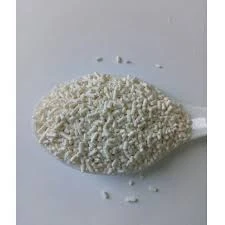
Exploring the Role of Emulsifiers in Food and Cosmetic Formulations
The Role of Emulsifiers in Food Science and Technology
Emulsifiers are a crucial component in the food industry, acting as crucial agents that enable the stabilization of emulsions—mixtures of two immiscible liquids, such as oil and water. These substances play an essential role in a variety of food products, ranging from salad dressings and mayonnaise to ice cream and chocolate. Understanding emulsifiers, their mechanisms, and their applications is vital to both food scientists and consumers who are interested in the functionality and quality of their food.
Understanding Emulsifiers
At the molecular level, emulsifiers possess a unique structure that allows them to interact with both hydrophilic (water-attracting) and hydrophobic (water-repelling) substances. Typically, an emulsifier has a hydrophilic head and a hydrophobic tail. This dual nature means that when emulsifiers are added to a mixture of oil and water, they can reduce the surface tension between the two phases, allowing them to blend more easily. As a result, emulsifiers help to create a stable emulsion by encapsulating oil droplets in a protective film that prevents them from coalescing.
Types of Emulsifiers
Emulsifiers can be categorized into several types, primarily based on their origin and chemical structure. The two main categories are natural and synthetic emulsifiers.
1. Natural Emulsifiers These include substances derived from plants or animals. Common examples are lecithin (found in egg yolks and soybeans), casein (a milk protein), and gum arabic (a natural gum obtained from the acacia tree). Natural emulsifiers are often preferred in food products due to their clean labels and perceived health benefits.
2. Synthetic Emulsifiers These are chemically modified compounds that are designed to enhance emulsifying properties. Examples include mono- and diglycerides, polysorbates, and sodium stearoyl lactylate. While they are effective at stabilizing emulsions, some consumers may be wary of synthetic additives, leading to a preference for more natural options.
Applications in Food Products
emulsifiers

Emulsifiers are fundamental in the formulation of many food products. For instance, in mayonnaise, emulsifiers allow for the stable mixture of oil and vinegar to create a creamy texture that is smooth and uniform. In ice cream, emulsifiers contribute to a desirable mouthfeel and help to maintain the stability of air bubbles, which is crucial for achieving the right texture.
Moreover, emulsifiers are vital in the chocolate industry, where they improve the flow of chocolate during processing and enhance the creaminess of the final product. Similarly, in baked goods, emulsifiers can improve dough stability and enhance the volume and crumb structure of bread.
Functional Benefits Beyond Stability
In addition to stabilizing emulsions, emulsifiers impart various functional benefits to food products. They can improve shelf life by preventing separation and rancidity, enhance texture by providing smoothness and creaminess, and serve as a means of incorporating flavors and nutrients. For example, in salad dressings, emulsifiers help to disperse spices and herbs evenly, ensuring a consistent flavor profile across each serving.
Consumer Perspectives and Health Implications
With rising health consciousness among consumers, the demand for cleaner labels and more natural ingredients has increased. As a result, many food manufacturers are reformulating their products to replace synthetic emulsifiers with natural alternatives. It is essential for consumers to understand that while emulsifiers are often viewed with skepticism, they are generally recognized as safe (GRAS) by regulatory bodies like the FDA.
However, not all emulsifiers are created equal. Some recent studies have linked certain synthetic emulsifiers to health issues, such as changes in gut microbiota. As research continues, consumers are encouraged to read product labels and make informed decisions based on their dietary preferences and health considerations.
Conclusion
Emulsifiers are indispensable in the food industry, performing a fundamental role in creating and stabilizing emulsions in a wide range of products. With advancements in food science and changing consumer preferences, the landscape of emulsifiers is evolving. Understanding their function and applications can help consumers appreciate the complexity and innovation behind the food they enjoy, while also making informed choices about their dietary intake. The continued exploration of both natural and synthetic emulsifiers will undoubtedly shape the future of food technology and consumer health.
-
Pure Sodium Dichloroisocyanurate Dihydrate | Powerful DisinfectantNewsAug.29,2025
-
Industrial Chemicals: Quality & Purity for Every IndustryNewsAug.28,2025
-
Nitrile Rubber Honoring Strict Production StandardsNewsAug.22,2025
-
Aspartame Ingredients Honoring Food Safety ValuesNewsAug.22,2025
-
Fertilizer for Balanced Plant NutritionNewsAug.22,2025
-
Cyanide Gold Processing with High Purity AdditivesNewsAug.22,2025
-
Formic Acid in Textile Dyeing ApplicationsNewsAug.22,2025
Hebei Tenger Chemical Technology Co., Ltd. focuses on the chemical industry and is committed to the export service of chemical raw materials.
-

view more DiethanolisopropanolamineIn the ever-growing field of chemical solutions, diethanolisopropanolamine (DEIPA) stands out as a versatile and important compound. Due to its unique chemical structure and properties, DEIPA is of interest to various industries including construction, personal care, and agriculture. -

view more TriisopropanolamineTriisopropanolamine (TIPA) alkanol amine substance, is a kind of alcohol amine compound with amino and alcohol hydroxyl, and because of its molecules contains both amino and hydroxyl. -

view more Tetramethyl Thiuram DisulfideTetramethyl thiuram disulfide, also known as TMTD, is a white to light-yellow powder with a distinct sulfur-like odor. It is soluble in organic solvents such as benzene, acetone, and ethyl acetate, making it highly versatile for use in different formulations. TMTD is known for its excellent vulcanization acceleration properties, which makes it a key ingredient in the production of rubber products. Additionally, it acts as an effective fungicide and bactericide, making it valuable in agricultural applications. Its high purity and stability ensure consistent performance, making it a preferred choice for manufacturers across various industries.





